This Is Why Aldi's Meat Is So Cheap
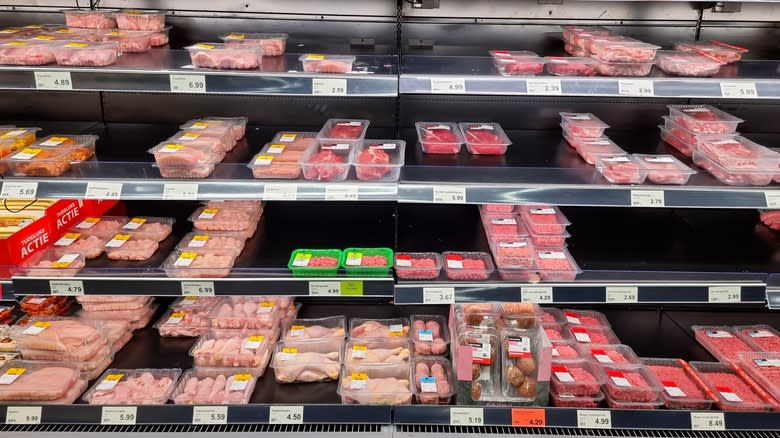
Aldi is celebrated across the United States for its range of low-priced products, including everything from alcohol to sweet treats. While much of the public can wrap its heads around cheap bottles of wine from around the world and bargain versions of name-brand cookies, many people often struggle to understand why Aldi's meat is so cheap. The following article provides some answers, revealing how sound business practices and a drive to save money (wherever possible) allow Aldi to sell its meat at bargain prices.
The lack of knowledge surrounding Aldi's price-reducing practices has led to several misconceptions regarding the store's affordable meats. Most prominent is the myth that Aldi's pork is grown in a lab. Dispelling such misbeliefs is vital if Americans are to make informed decisions about where to buy meat. What's more, Aldi plans to open 800 new stores in the U.S. by 2028, indicating that the number of Americans shopping at Aldi will increase. For these reasons, we're aiming to improve your understanding of why Aldi's meat comes at such low prices.
Read more: 10 Frozen Foods You Should Always Buy At Aldi
It's Sold Under A Private Label
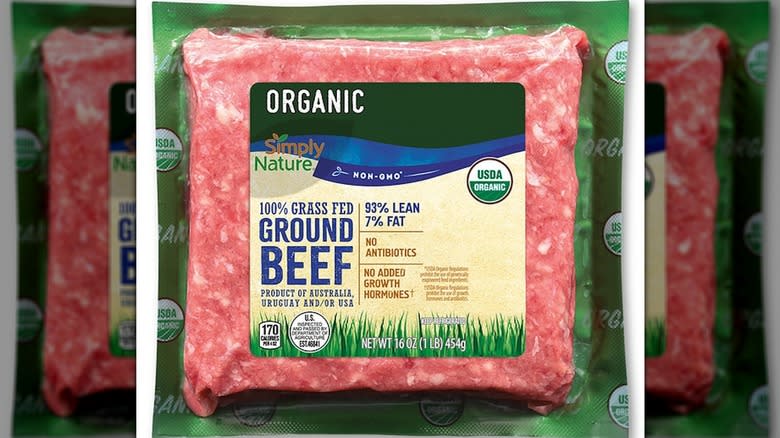
Aldi is known for stocking private-label products in place of well-known brands. A report by Statista shows that, during 2022, over 77% of all products sold in Aldi US stores were private-label products. The store's preference for private labels is reflected in the meat section; Aldi sells most of its meat under private labels like Appleton Farms, a brand that sells products like bacon, and Simply Nature, Aldi's brand for organic and non-GMO products.
Stocking private-label meat saves Aldi a huge amount of money, as the products are produced to exact specifications and can be purchased in enormous volumes. Suppliers that sell private label products to Aldi also do not need to factor in other costs often associated with branded products, such as marketing. These savings are passed onto Aldi.
Aldi is committed to not being beaten on price. This means that the vast majority of savings Aldi makes by sourcing private-label meat are reflected in product prices. While this means Aldi's profit margins are some of the smallest in the business, it also enables the store to price its meat lower than competitors.
Money Is Saved In Other Aspects Of The Business
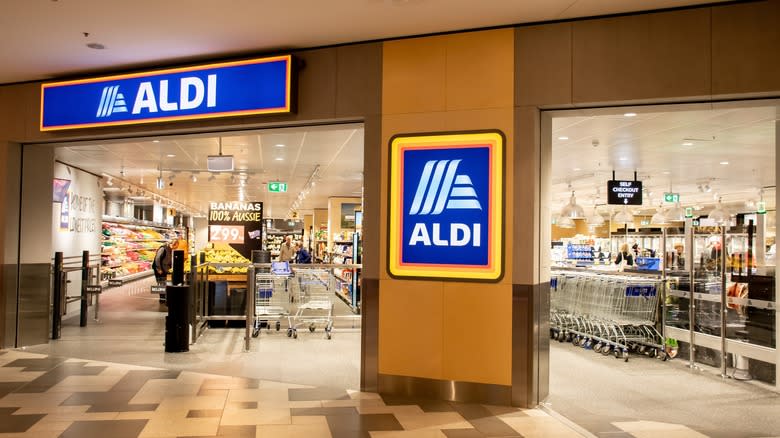
Aldi has long been famous for having harsh stores that boast little to no decoration. The reason Aldi eschews decorations is simple: decorations cost money. Although customers might not realize it, they are usually the ones who are paying for decorations -- as well as other aspects of the shopping experience -- through inflated prices.
Tom Cindel, senior member of Aldi U.S., explained this to FoodNavigator USA: "Behind the scenes of traditional grocery stores, everything you do gets added to the cost of the product. Take bags. They were never 'free.' You always paid for the bags, they were just built into the price of the foods in the stores. At Aldi, we don't do that." Aldi does the opposite, cutting costs at every opportunity so it can lower the price of its products, including meat.
Another way the store saves money is by employing a small number of people per shift. It is not uncommon for less than five employees to make up an entire shift. In competing stores, such as Walmart, the number of employees per shift is many times that number. There are many reasons why Aldi can run stores with fewer employees, including a smaller store size and a robust training program that enables all employees to perform a variety of tasks. As a result, Aldi spends significantly less on wages than competing grocery brands. These savings are reflected in the price of the company's products.
Aldi Buys Meat Locally
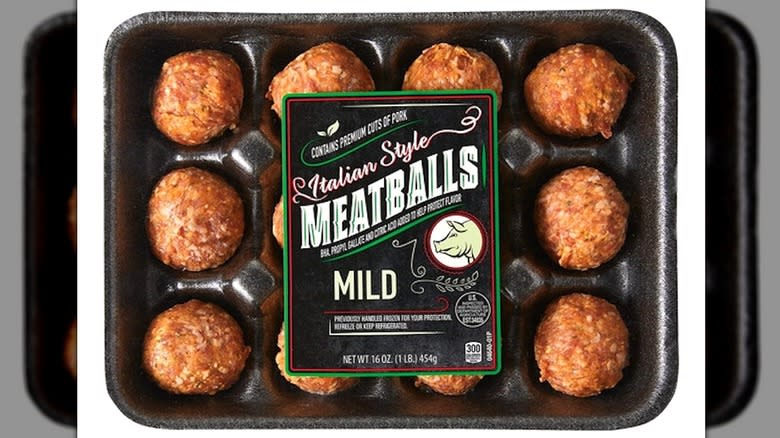
There are well over 2,300 Aldi stores located in the U.S. To best supply these stores, Aldi sources its meat from various regional farms and businesses. Purchasing meat from local sources makes sense for several reasons. The first of these is scale. With so many stores across the country, there isn't a single farm or business that could supply the whole of Aldi U.S. with meat. It makes much more sense for stores to build relationships with those farms that are near to them. Another reason is, of course, cost. For Aldi, buying local meat is much cheaper than buying from distant sources, as the products do not have to be transported large distances.
This is not to say some meat isn't imported. Aldi is known to occasionally stock imported products, such as its Specially Selected Rack of Lamb. However, these meats are the exception rather than the norm. Generally speaking, these imported meats are more expensive than domestically reared products. Finally, those eager to avoid imported meat need not worry; products made outside of the U.S. will always have their origin clearly labeled on the packet, making them easy to identify.
It Doesn't Carry A Lot Of Options
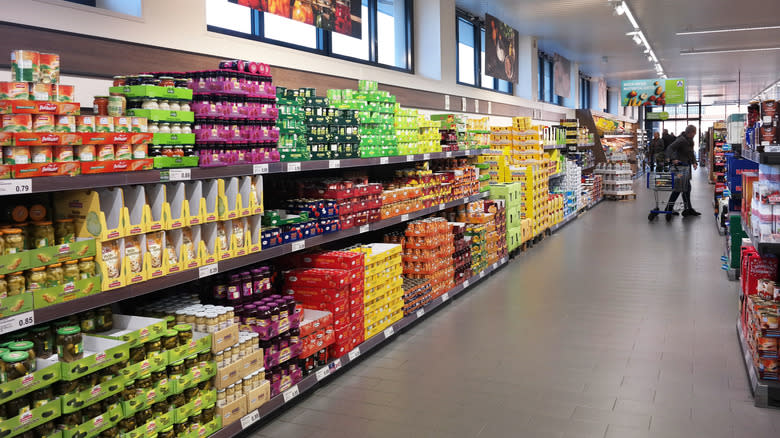
Aldi stores have, on average, a square footage of around 12,000. This is considerably smaller than the stores of its competitors. These small stores mean Aldi has much less shelf space when compared to the likes of Walmart and Costco. Due to this, Aldi stocks far fewer products, around 1,400 per store. For comparison, the average Walmart supercenter stocks well over 100,000.
Due to space constrictions, Aldi cannot carry numerous versions of the same product. Instead, a limited variety must suffice. Take ground beef, for example. There are eight ground beef products listed on the Aldi U.S. website. A search for the same product on Walmart.com yields over 200 results.
Stocking a limited variety of meats saves Aldi a huge amount of money for several reasons. Most importantly, it allows core products to be bought -- and sold -- in massive quantities. The potential of such focused, large sales all but ensures suppliers give Aldi exceptional deals. Tom Cindel highlighted this to FoodNavigator USA: "You are going to give us a good price, because we are going to drive a ton of volume. We've got [over] 1,750 stores in the US and yours is the only product we are going to sell." Of course, the low amount Aldi pays for these products is directly reflected in the meat's final price.
There Aren't Any In-Store Butchers
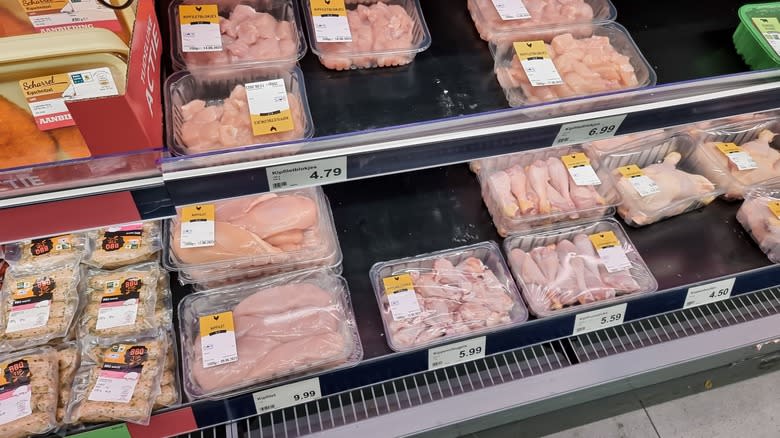
Many of Aldi's competitors, including Costco, have in-store butcher counters. Here, trained professionals prepare a variety of cuts, allowing customers to order exactly what they want. Aldi does not have in-store butcher counters. Instead, all meat is cut and packaged to the company's specifications before reaching the store. While this means customers cannot order custom cuts of meat, it does allow Aldi to price its products exceptionally low.
As we've seen, Aldi operates its stores with small teams. This only works because all Aldi employees are trained to work in multiple roles, allowing them to meet various demands when needed. But expecting an Aldi employee to cut meat is a step too far. Becoming a butcher takes years of training, making training all Aldi employees in this way unfeasible. Other companies negate this issue by hiring specialists who only work at the butcher's counter. However, this greatly increases their wage bill and necessitates the subsequent raising of product prices, especially meat.
By not having butcher's counters, Aldi avoids an expensive wage bill, allowing them to keep prices low. What's more, research from The Food Industry Association suggests the vast majority of shoppers don't make the most of butcher counters, suggesting Aldi customers aren't missing out. The study revealed that, while the vast majority of meat consumers go to stores with service counters, 75% of meat sales are made up of pre-cut and packaged meat.
Meat Is Sometimes Included In Aldi Finds

Aldi Finds is a weekly rotating array of limited-stock products that Aldi sells in stores. Usually, these products are purchased to match current market trends and are often sourced from other companies' excess stock. The vast majority of these products are not groceries. Instead, they are made up of clothes, toys, and cooking equipment. That said, food products, including meat, are sometimes sold as Aldi Finds. When they are, they're usually a steal.
Without fail, meat products sold as part of the Aldi Finds promotion are cheap. For example, USDA Choice Beef Birria Chuck Roasts are sold for as little as $5.29 per pound, and a 22-ounce bag of Tyson Fajita Grilled Chicken Strips is sold for $7.99. Some of these deals are so good that customers have complained of meat products in Aldi Finds selling out only a few hours after they are released on Wednesday mornings.
The Chain Sells A Large Volume Of Meat

As we've seen, Aldi's limited offering means that the meat products it stocks sell at low prices and in huge quantities. Impressively, Aldi's sales volume is only increasing, as the store gains a reputation as one of the best places to buy cheap, quality meat in the U.S. This is reflected in statistics. According to Supermarket News, Aldi's meat sales in the U.S. grew by nearly 50% between 2018 and 2023.
These healthy sales numbers give the company the potential to lower its already low prices. This is because huge sales volumes allow the company to take full advantage of economies of scale. By increasing product volume, producers can lower the costs associated with making, packaging, and shipping Aldi's meat products. It's reasonable to expect that some, if not all, of these savings are handed on to Aldi before ultimately being reflected in the final prices of its meats.
Meat Is Often Marked Down To Reduce Waste
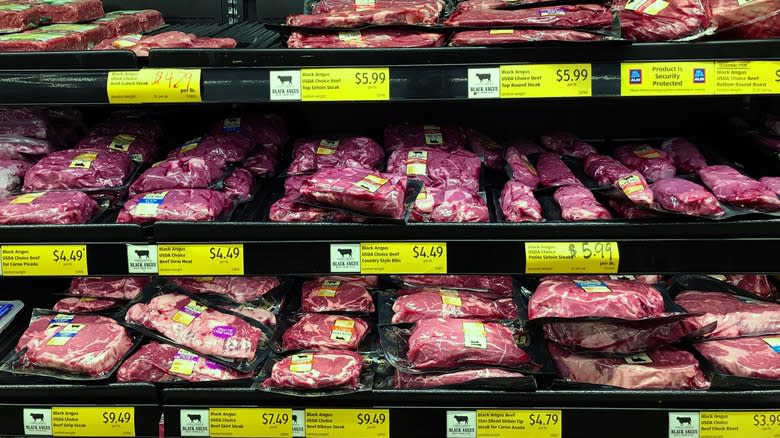
Aldi has made various pledges regarding the business' sustainability. Halving the company's food waste by 2030 is one of these. Efficient ordering, transportation, and storing processes are required in order to make this goal a reality. Another key way of reducing food waste is to ensure that perishable goods, such as meat, are sold before they exceed their sell-by date.
A key way many stores sell food that's in danger of passing its sell-by date is to mark down the price. Aldi marks down its meat products multiple times per week with the price dropping significantly each time. This gives shoppers ample opportunity to find and buy incredibly cheap meat products. Some customers go even further, learning what time their local Aldi tends to mark down meat products to guarantee they have the pick of the best deals.
Marked-down meat is a win-win scenario. Aldi avoids food waste and recoups some of its expenditure while shoppers grab a bargain. The marked-down prices are often so good that people buy the products even if they do not plan on using them for several days. This isn't as dangerous as it seems; food is not automatically spoiled once it exceeds its sell-by date. The meat can even be safely stored in the freezer until needed. If proper meat-thawing practices are observed, there will be no discernible drop in the quality of the meat.
Read the original article on Daily Meal

 Yahoo Finance
Yahoo Finance 